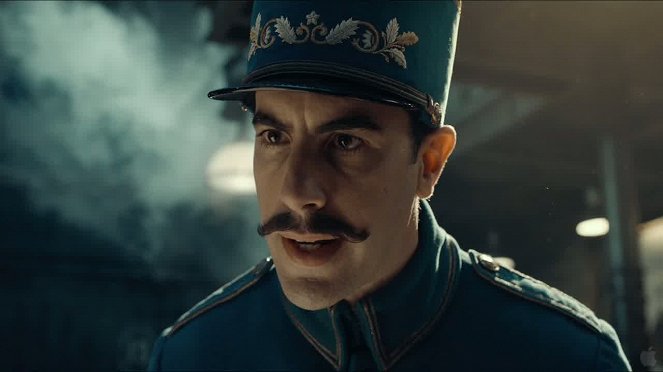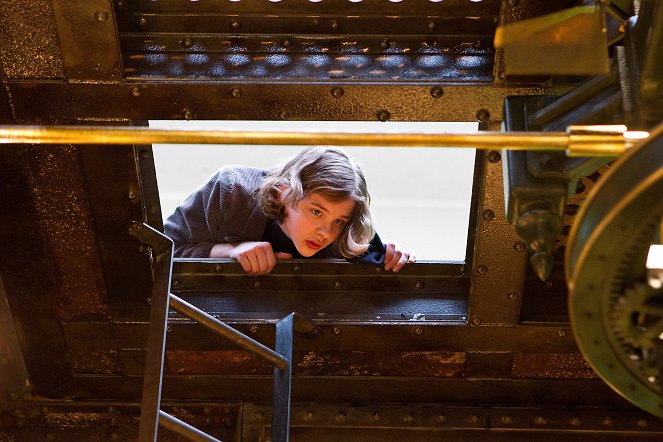Directed by:
Martin ScorseseScreenplay:
John LoganCinematography:
Robert RichardsonComposer:
Howard ShoreCast:
Ben Kingsley, Sacha Baron Cohen, Asa Butterfield, Chloë Grace Moretz, Ray Winstone, Emily Mortimer, Christopher Lee, Helen McCrory, Michael Stuhlbarg (more)VOD (3)
Plots(1)
After his clockmaker father (Jude Law) perishes in a museum fire, Hugo goes to live with his Uncle Claude (Ray Winstone), a drunkard who maintains the clocks at a Paris train station. When Claude disappears, Hugo carries on his work and fends for himself by stealing food from area merchants. In his free time, he attempts to repair an automaton his father rescued from the museum, while trying to evade the station inspector (Sacha Baron Cohen), a World War I veteran with no sympathy for lawbreakers. When Georges (Ben Kingsley), a toymaker, catches Hugo stealing parts for his mechanical man, he recruits him as an assistant to repay his debt. If Georges is guarded, his open-hearted ward, Isabelle (Chloë Moretz), introduces Hugo to a kindly bookseller (Christopher Lee), who directs them to a motion-picture museum, where they meet film scholar René (Michael Stuhlbarg). In helping unlock the secret of the automaton, they learn about the roots of cinema, starting with the Lumière brothers, and give a forgotten movie pioneer his due, thus illustrating the importance of film preservation, a cause to which the director has dedicated his life. If Scorsese's adaptation of "The Invention of Hugo Cabret" isn't his most autobiographical work, it just may be his most personal. (Entertainment in Video)
(more)Videos (16)
Reviews (12)
A wonderful tribute to cinema as such, which could only have been made by a filmmaker for whom cinema is truly the one and only purpose in life. In his amazing career, Scorsese has produced many successful and legendary films that have rewritten and greatly influenced the history of cinema, so he decided to pay homage to the man who started it all. And it wouldn't be him if he didn't embellish the story with a special atmosphere, if every detail wasn't perfectly executed and on point, and if he didn't shape the entire film in a way that's simply unforgettable. Hugo is sweet as a family film, charming as a playful fantasy, and as a whole incredibly wholesome, funny and harmonious. Though it’s true that they could have gone a bit easier on the sugar and that all the motifs don’t quite fit together as intended, but these are slight flaws perfectly masked under Scorsese's precise direction. I didn’t like Butterfield very much, but Kingsley and Cohen in particular are brilliant. 4 and 1/2*
()
The original book has turned into an unoriginal film in which every added thing is just excessive. A lot of scenes seem to have been made just for the vaunted 3D (especially the completely unnecessary train accident), the story is strangely sloppy, too set-up, and Sacha Baron Cohen makes too big a fool of himself... Yes, the direction is skillful, the love for Hugo films is also very nice, but I certainly didn't see anything groundbreaking. Which is quite a shame. I don't tend to do that, but this time I really want to scream: Read the book, it's so much better!
()
A movie about movies for people who like movies. Nothing earth-shattering in terms of story, but Marty reminds me of Méliès himself in terms of technical implementation and eye for detail. The same applies to the old captivating images hidden throughout the picture. Movies used to be a way of creating dreams, while today the audience wants to see reality. And isn’t there enough room for both?
()
Some dreams do come true. The magic of film intertwined with reality, sketches with meticulously crafted images fly through the air, and Martin Scorsese pays homage to the beginnings of cinematography without getting overly sentimental or desperately trying to make the movie into a classic. Hugo seems like a sophisticated fairy tale about a boy and his great adventure, only to ultimately transform into a fascinating journey through human imagination and determination. And that nostalgic hurricane of memories of children's books and movies, as well as fascination with unreachable worlds, has a power that managed to captivate me completely.
()
More than just a tribute to the forefather of cinematic brats (weaned and further nourished on the sci-fi, fantasy and horror genres). The web of references to films and filmmakers who were influenced by Meliés and who possibly influenced Scorsese (who came to Meliés through his own spiritual father, Michael Powell) has multiple layers and one viewing is not nearly enough to disentangle them, while the revealing of the central idea, which is underpinned by numerous allusions, is no less entertaining. Film as a mechanical means of reviving memories, bringing people together and creating dreams. Here, only cinematic dreams, not real ones, which have the form of nightmares, serve as a reliable means of escape from reality (we therefore also mainly see examples from Meliés’s special-effects films and less from his reconstructed events). (In the second bad dream, there is a peculiar absence of clocks, i.e. time as a dimension, which mechanical inventions other than film lack). ___ The story isn’t divided into two parts; from the beginning, it’s about repairing a broken machine, with the first part accenting the mechanical level and the second part placing emphasis on the human level. We mainly see the machines first. They are placed in the foreground of the mis-en-scéne and, at the same time, Hugo pins all of his hopes on them. The first part also comes closer to grotesque films, as a human functions as an inanimate, mechanical object. The second part, from the activation of the automaton, is a partial negation of the modernistic enthusiasm over technological progress. Hugo starts to realise that the machines will not change anything about his loneliness. The guard’s mechanical leg, previously used as a source of gags, becomes a means of becoming close to the flower girl, who lost her brother at Verdun (mass slaughter thanks to the use of modern technology). The settings of the action are expanded with the addition of Meliés’s household and library. Books and people get more space. Technology is talked (theorised) about more than it is shown. ___ The mechanical thesis and the human antithesis logically lead to cinematic synthesis, to the joining of reason and emotion as, for example, Jean Epstein wrote about it (La Lyrosophie). The conclusion brings separate “peephole” scenes (gags) like those from early films into the overall narrative. Like the characters, these scenes find their place, their meaning. The film is constructed in such a way that it can result in a film. I cannot imagine a more wonderful tribute to the very idea of moving pictures. ___ The historical inaccuracies that Scorsese allows are easier to criticise than the outwardly atypical plot structure. Viewers’ dodging of the oncoming train can still be tolerated when reading the book by Tabard, who, as it happens, was not accurate in writing about Meliés, but not in Meliés’s own memoirs, which corrected other authorial errors. Meliés did not come across cinema by accident, as he was personally invited to a public film screening by the Lumière brothers and he did not create the camera from nothing, but improved an existing model by R.W. Paul. The decline in interest in his work did not come until the First World War. By about 1909, Meliés’s laborious method had made it simply impossible for him to shoot as quickly as the times demanded and he completed his final film in 1913. However, these details are overshadowed by his incredibly precise revival of old Paris and even older films (several seconds of Le Royaume des fées are memorable). The transfer into 3D gave these a new dimension without diminishing their charm. They are improved, though indirectly, by highlighting their meaning. Scorsese not only proclaims his love for film, but also calls on us not to forget. 90%
()
(less)
(more)



Ads